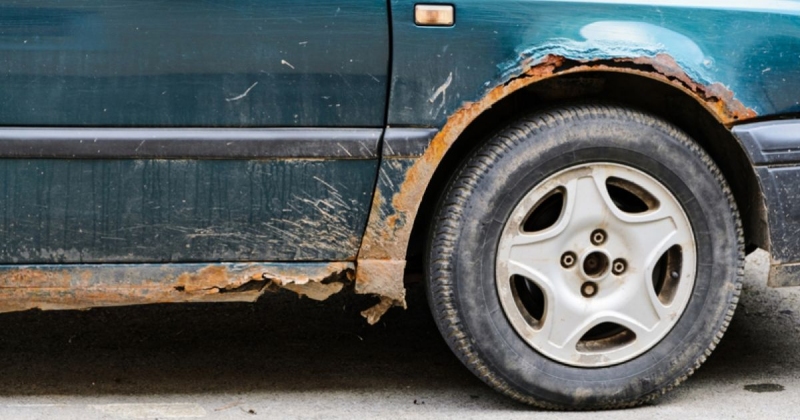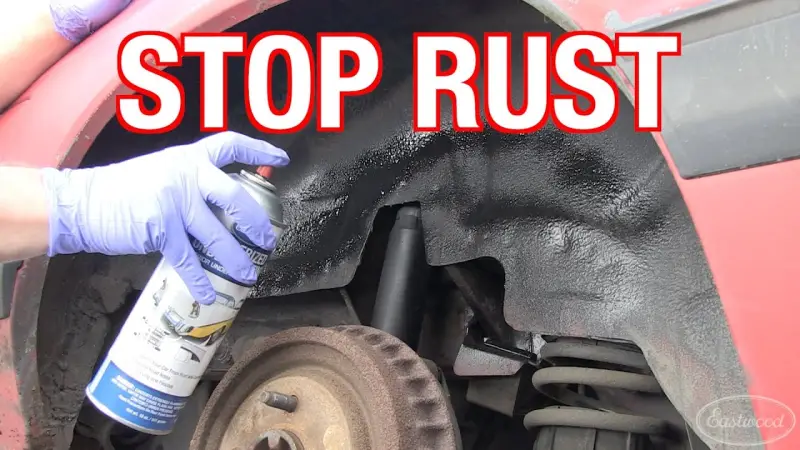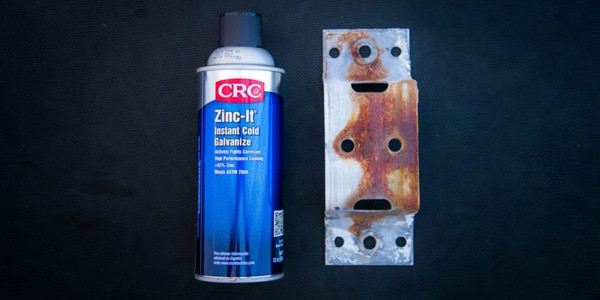Rust is a common issue that affects many cars, especially those that are frequently exposed to moisture and harsh weather conditions. Not only does rust make your car look unsightly, but it can also weaken the metal and cause structural damage if left untreated. However, with a little effort, you can stop rust from spreading and keep your car looking good for years to come.
One of the most effective ways to prevent rust from spreading on your car is to wash it regularly and keep it dry. This helps to remove any moisture or salt that may be present on the surface, which can accelerate the rusting process. If you live in a region with harsh weather conditions, it may be necessary to wash your car more frequently. You should also make sure to dry the car thoroughly after washing it, as moisture left on the surface can cause rust to form.
Another effective method to stop rust from spreading on your car is to have it professionally rust-proofed. This involves applying a special coating to the underbody and other vulnerable areas of the car, which helps to prevent rust from forming and spreading. Some car dealerships and automotive service centers offer rust-proofing services, but you can also have it done by a specialist. Regular rust-proofing treatments will help to extend the life of your car and prevent the need for costly repairs in the future.
How To Stop Rust From Spreading On A Car Overview
First things first, let’s talk about the cause of rust. Rust is caused by the reaction between iron and moisture, so keeping your car dry and free from moisture is key to preventing rust from forming. A good way to do this is by washing your car regularly, especially after it’s been exposed to rain or snow. When you wash your car, make sure to dry it thoroughly, paying special attention to the underbody and other areas that are vulnerable to rust.
Now, let’s talk about products and materials. There are a lot of great products on the market that can help stop rust from spreading on your car. For example, rust inhibitors are a type of product that you can add to the paint or undercoating of your car. They work by forming a barrier between the metal and the moisture, which stops the rust from forming. There are also rust converter products that can be applied to existing rust to help stop it from spreading.
Another way to stop rust from spreading is to have your car professionally rust-proofed. This involves applying a special coating to the underbody and other vulnerable areas of the car, which helps to prevent rust from forming and spreading. Professional rust-proofing can be done at car dealerships or automotive service centers, or by a specialist. This is a great option if you want to give your car the ultimate protection against rust.
And finally, let’s talk about regular maintenance. Regular inspections and maintenance of your car can help to catch rust early, before it has a chance to spread. This includes checking the underbody and other vulnerable areas for signs of rust and addressing them promptly. By keeping on top of regular maintenance, you’ll be able to keep your car looking great and rust-free for years to come.
In conclusion, stopping rust from spreading on your car is a must, and there are a lot of great products and methods available to help you do just that! Whether it’s keeping your car dry and wash, using rust inhibitors, having it professionally rust-proofed, or maintaining it regularly, there are a lot of ways to stop rust from spreading and keep your car looking great for years to come.
How To Stop Rust From Spreading On A Car – Methods in Comparison
- Undercoating: This involves applying a rubberized coating to the underbody and other vulnerable areas of the car to prevent rust from forming. This coating helps to prevent moisture from reaching the metal, which stops the rust from forming.
- Rust inhibitors: Rust inhibitors are chemical compounds that can be added to paint or undercoating to help stop rust from forming. They work by forming a barrier between the metal and the moisture, which stops the rust from forming.
- Galvanization: This is a process that involves coating the metal with a layer of zinc, which helps to protect the metal from rust. The zinc acts as a barrier between the metal and the moisture, which stops the rust from forming.
- Powder coating: This is a process that involves applying a fine powder to the metal, which is then baked on to create a hard, protective coating. This coating helps to prevent moisture from reaching the metal, which stops the rust from forming.
- Cathodic protection: This is a process that involves attaching an electrode to the metal, which helps to reduce the potential for rust to form. The electrode acts as a sacrificial anode, which corrodes instead of the metal, which stops the rust from forming.
| Method | Pros | Cons |
|---|---|---|
| Undercoating | Durable protection, prevents moisture from reaching the metal | Can be messy and difficult to apply, may not be suitable for all cars |
| Rust inhibitors | Easy to apply, prevents moisture from reaching the metal | May not be as durable as other methods, can be expensive |
| Galvanization | Durable protection, long-lasting, prevents moisture from reaching the metal | Can be expensive, may not be suitable for all cars |
| Powder coating | Durable protection, long-lasting, prevents moisture from reaching the metal | Can be expensive, may not be suitable for all cars |
| Cathodic protection | Durable protection, long-lasting, effective in preventing rust | Can be expensive, may not be suitable for all cars |
In conclusion, each of the permanent methods to stop rust from spreading on a car has its own advantages and disadvantages. The best method for your car will depend on your specific needs, budget, and the condition of your car. Be sure to consult with a professional if you are unsure which method is best for your car.

Equipment To Work With How To Stop Rust From Spreading On A Car
| Equipment | Purpose |
|---|---|
| Car wash soap | To clean the car and remove any dirt or debris that may cause rust to form |
| Microfiber towels | To dry the car thoroughly after washing |
| Rust inhibitors | To add to the paint or undercoating to help prevent rust from forming |
| Paintbrush or spray bottle | To apply rust inhibitors or other rust-preventative products |
| Sandpaper | To remove any surface rust before applying rust inhibitors or other rust-preventative products |
| Rust converter | To treat existing rust and help stop it from spreading |
| Protective gloves | To protect your hands from the chemicals in rust inhibitors, rust converters, or other rust-preventative products |
| Safety glasses | To protect your eyes from any splashes or sprays from rust inhibitors, rust converters, or other rust-preventative products |
| Welding equipment | If you are doing any metal repairs, welding equipment may be necessary |
Having the right equipment is important to help you effectively stop rust from spreading on your car. Be sure to use the right products and equipment for the job to ensure the best results and keep your car looking great for years to come.
Step By Step Instruction On How To Stop Rust From Spreading On A Car
- Clean the car: Start by washing your car with car wash soap to remove any dirt or debris that may cause rust to form. Make sure to dry the car thoroughly using microfiber towels.
- Inspect the car: Look for any signs of rust, including surface rust or rust that has begun to spread. Make note of any areas that need attention.
- Remove surface rust: If you find any surface rust, use sandpaper to remove it. This will help to prevent the rust from spreading and will also prepare the surface for any rust-preventative products you may need to apply.
- Apply rust inhibitors: If there are any areas of your car that are prone to rust, you may want to consider applying rust inhibitors. These chemical compounds can be added to paint or undercoating to help prevent rust from forming. You can apply rust inhibitors using a paintbrush or a spray bottle.
- Treat existing rust: If you have any existing rust on your car, you can treat it using a rust converter. This product will help to stop the rust from spreading and will also prepare the surface for any rust-preventative products you may need to apply.
- Weld metal repairs: If you have any metal repairs to make, you can use welding equipment to fix them. This will help to prevent rust from forming in those areas in the future.
- Apply undercoating: If you want to provide additional protection for your car, you can apply undercoating. This rubberized coating can be applied to the underbody and other vulnerable areas of the car to help prevent rust from forming.
- Protect yourself: Make sure to wear protective gloves and safety glasses when working with any rust-preventative products or welding equipment to protect yourself from any harmful chemicals or debris.
By following these steps, you can effectively stop rust from spreading on your car and keep it looking great for years to come. Just be sure to take your time and follow the instructions carefully to ensure the best results.

F.A.Q.
What causes rust on a car?
Rust forms on a car when metal reacts with oxygen and moisture, causing it to corrode and eventually form rust. This can be caused by exposure to rain, snow, or other moisture, as well as by small nicks or scratches in the paint that allow moisture to reach the metal underneath.
How do I know if my car has rust?
You can look for signs of rust on your car by inspecting it regularly. Look for any discoloration or pitting on the metal surfaces, as well as any areas that are beginning to flake or peel.
What is the best way to remove surface rust?
The best way to remove surface rust is to use sandpaper to sand it off. Be sure to remove all of the rust and any surrounding paint that may be affected before applying any rust-preventative products.
How often should I inspect my car for rust?
It’s a good idea to inspect your car for rust at least once a year, or more often if you live in an area with high humidity or frequent exposure to moisture.
Can rust inhibitors be used on all types of cars?
Yes, rust inhibitors can be used on all types of cars. However, be sure to check the manufacturer’s instructions for any specific recommendations for your car.
Is it better to treat rust or prevent it from forming?
It’s always better to prevent rust from forming in the first place. However, if you do find rust on your car, it’s important to treat it as soon as possible to help stop it from spreading.
Can I use rust inhibitors on an already rusted surface?
Yes, you can use rust inhibitors on an already rusted surface, but it is recommended to treat the rust first using a rust converter.
How long does it take for rust inhibitors to work?
The length of time it takes for rust inhibitors to work can vary, depending on the product and the conditions it is exposed to. Generally, you can expect rust inhibitors to provide protection for several years, but it is always a good idea to inspect your car regularly and reapply the product as needed.



Leave a Reply